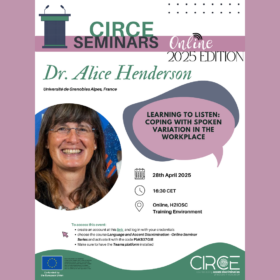
The Erasmus+ CIRCE project online seminar “Learning to listen: coping with spoken variation in the workplace” will be held on 28 April 2025, at 16:30 (CEST). Speaker: Alice Henderson (Université de Grenoble Alpes, France).
The free seminar, organised in collaboration with the H2IOSC project and Cnr-Istituto di Linguistica Computazionale “Antonio Zampolli”, will be included in the H2IOSC Training Environment to enable all interested parties to access the event registration.
Speaker Bio
Alice Henderson is a Professor at Université Grenoble – Alpes, France where she teaches English for Specific Purposes to Science & Technology students. She taught English phonetics and phonology for 24 years and has been involved in training teachers in France, Norway, Poland, and Spain. In 2009 she initiated the international bi-annual conference English Pronunciation: Issues & Practices. Her research interests include English pronunciation teaching and learning, the perception of foreign-accented speech, and English Medium Instruction (EMI). Much of her research has focused on speakers, but she is also intrigued by listeners’ roles, from an intercultural and sociolinguistic perspective.
Summary
The university workplace is representative of international-ised/-ising workplaces in general, where different communities, languages, and cultures coexist. Staff encounter their colleagues’ and students’ accents – of Italian, of English, and in my case, French – and sometimes the result is that communication can be quite hard work. Even with the best intentions, sometimes we just cannot understand a speaker. However, when we think about spoken interactions, we have to accept that it is not just about how the speaker produces a language; the actions and skills of listeners should also be addressed. This flip or change of perspective begs two questions: can we, as listeners, learn to cope better with spoken variation? And if so, how?
In this talk I’ll summarize speech research findings about how listeners can improve their ability to adapt to new speakers and new accents. I’ll look at listener accommodation and accentism, as well as the conceptual trio of accentedness, comprehensibility and intelligibility. I’ll describe concrete ways to prepare listeners to cope with accented speech, with a primary focus on listeners instead of speakers. Examples will come mainly from my work with non-academic staff at a large, French public university; my 1-hour format for listener training can be reused in other professional contexts. If possible, I’ll also describe the next steps in this work, as I prepare to continue training previous workshop participants as part of a longitudinal study.

